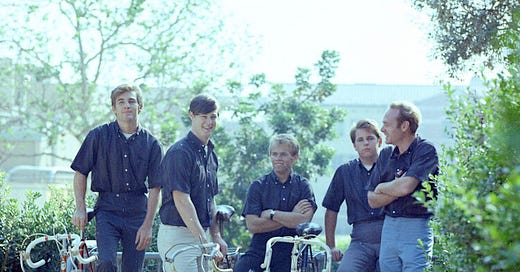It was usually late August in every year when radio DJs would start playing the Beach Boys’ “All Summer Long.” The song provided the title for a 1964 album and the pictures on the cover—the group romping on the beach with their girls, riding bikes or horses, burying each other in the sand, smiling or laughing or nuzzling their honeys—and that title suggested the Beach boys were about to proclaim the utopia they presided over as an invincible kingdom. “All Summer Long” was really an admission of just how fragile that domain was.
If you were an American kid listening to the radio in August the tossed-off line, “won’t be long till summertime is through” made you die a little inside at the prospect of school starting again. Hearing the DJ spin “All Summer Long”—almost always late at night, as if its appearance would have turned the summer sunshine to darkness—was a yearly ritual that inspired both bittersweetness and dread. You didn’t have to love summer—and I have spent more summer days in an air-conditioned room with a fat novel than I have out in the sun—to hear Brian Wilson’s vision of surfing and cruising, of hanging out with his buddies and girls on the beach or the strip, and want in. Like all great pop visions Brian’s was essentially inclusive, it sounded as if the group were holding a place around the campfire just for you. They didn’t have to title a 1977 album The Beach Boys Love You: that was implicit from the moment they appeared.
As the Beatles did, they offered a promise of life enriched by camaraderie and fun and love. And because there are always people who believe that an optimistic vision can only be shallow or false, who believe that there’s only alienation to be found in the goodies of consumer culture, the Southern California utopia outlined by the Beach Boys has been called a lie. I don’t mean that “I Get Around” was a documentary of Southern California teen life. I mean that the emotion in the song was authentic and the hard work done to achieve that emotion, the seemingly effortless perfection of the group’s harmonies and Brian’s ability to disguise the sweat he put into his own studio mastery, spoke of the Beach Boys’ belief in the vision of good times they evoked, their dedication to it suggesting that for them fun and friendship were something like a statement of ethics.
It's tempting to think of the Beach Boys’ career from 1962 to 1966 (that is, from Surfin’ Safari to Pet Sounds) as having the ephemeral quality of a summer vacation and “All Summer Long” as an early elegy. Jimi Hendrix’s 1967 declaration about never having to listen to surf music again was unnecessary. By then the Beach Boys were out of fashion and largely off the charts, though it’s tempting to think that Brian Wilson’s entire career can be summed up by one of the slogans that appeared on the walls of Paris in May 1968: I decree the state of permanent happiness.
But Wild Honey, the album the Beach Boys released at the end of 1967, and that went no higher than Number 42 in the charts, was about what you do when you realize that state can’t last, that it’s time to grow up, that fall is in the air. Brian’s failure to deliver on his promised masterpiece Smile turned him away from the studio (Smiley Smile, the album that came between Pet Sounds and Wild Honey was an attempt to salvage the fragments of Smile) and back to one-on-one interactions with the group who had become sidemen working to realize his ideas (the producing credit even changed from “Brian Wilson” to “The Beach Boys”). The sound of Wild Honey bears the same relation to Pet Sounds that the sound of The White Album does to Sgt. Pepper’s: It’s the unrestricted breath of air you take after producing a fussed-over masterpiece. Wild Honey is about getting the breathing space to find your own path. The perfectionism that drove Brian to attempt Smile led him to a breakdown. From the moment Wild Honey opens with the rising and falling keyboard waves the casual shagginess of the album exudes freedom like nothing from the group since the great Beach Boys Party! in 1965. Wild Honey sounds as if the group is relaxed enough to enjoy the fun it always stumped for. You can hear it in the joyous and raw vocals of soul aficionado Carl Wilson on the title track and the cover of Stevie Wonder’s “I Was Made to Love Her.” Trying to top Stevie isn’t the point; the point is the exhilaration Stevie’s performance inspired in Carl.
Shifting from the suburbs to the country, most noticeably in the wafting, incandescent “Country Air,” allowed the Beach Boys to extend their vision of utopia beyond the beach and the drag strip, even to something as mundane washing the dishes, which Brian sings about in “I’d Love Just Once to See You.”
If being able to see pleasure beyond SoCal teen life was a sign of entering adulthood, that’s what makes the album’s closer “Mama Says,” so poignant. Barely a minute long, this a capella track consists entire of harmonic variations of the lines:
Eat a lot, sleep a lot
Brush ‘em like crazy
Run a lot, do a lot
Never be lazy
Nineteen words that offer a peerless evocation of a tanned, happy childhood, the song is the Beach Boys’ version of Dylan Thomas’ “Fern Hill” the switch in the harmonies from syncopated to languid evoking the gentle slippage of time. “Mama Says” is the Beach Boys moving into adulthood and offering a benediction on their own recent past, a time in which, to use Thomas’ imagery, they were green and dying and singing in their chains like the sea.
This is for Kim Morgan, who loved Brian.




